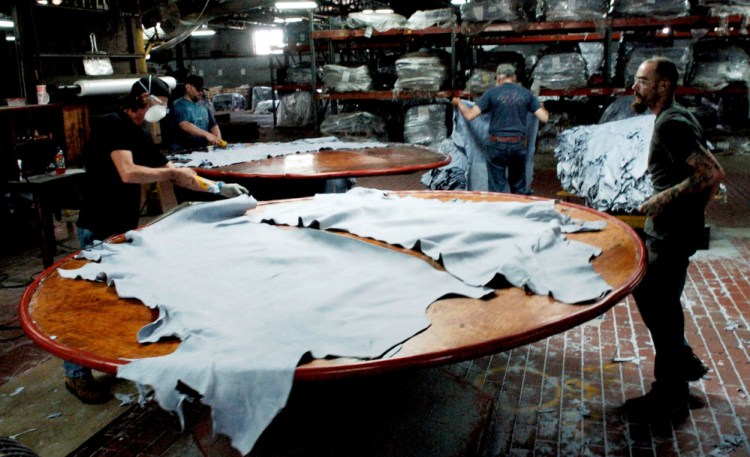CAPE PORPOISE — At 18, I left the central Maine tannery town where I grew up, seeking education and opportunity. Already, back in the late 1960s, the town’s economy and its people’s well-being were far secondary to the tannery’s profits. Boxcars of Argentine and Australian cowhides displaced hides from America’s Western states. Soon, trailer trucks replaced freight trains and in another decade or so, the tracks were pulled up.
Now automation has displaced workers who once gave back benefits and wage increases and voted down unionization because owners threatened to move elsewhere. These conditions guaranteed substandard paychecks and poor health care. The local hospital became a nursing home. My hometown imploded economically. Hitchhiking 50 years ago, I could measure its economic decline by houses falling to the ground.
Last year, the town assumed responsibility for cleaning the river that the tannery polluted for decades. Tannery attorneys, I assume, accomplished the liability transfer because townspeople feared that the remaining jobs might be lost.
My childhood home fell into its cellar in the 1990s. My parents, brothers and sisters left town to find jobs. Still others remained behind. Their children often moved into doublewides or struggled with basic repairs to old family houses. Cost of living, meanwhile, did not keep up with wages. Some old friends barely got by.
Yes, a few rural towns like Millinocket with its booming, unionized mills managed a bit longer as middle-class working communities with good schools, but eventually they too lost out to technological advances, resource depletion and lower-wage competition. Life at the global economy’s periphery is hard. Poverty and drugs drag down lives.
My town has always been at the edge of the global economy. Much of rural Maine is. Some of my friends’ children became addicted to opioid painkillers and alcohol. Then heroin crept in. Economic woes affected Maine’s urban economy as well. Many homeless and drug-addicted youths migrated to the streets and shelters of Portland and other cities.
Decades of economic disintegration have political consequences, too. The breakdown of the 2016 election by Maine’s counties demonstrates that those most hurt by globalization voted for Donald Trump. Meanwhile, unscrupulous business and political leaders amassed fortunes in offshore shelters, manipulating the law and profiting from pitting lower-wage workers in Asia against higher-wage ones in Maine.
Yet, as one critically assesses corporate-driven globalization’s impact on Maine’s logging, textile, tanning, agriculture, fishing, shoe shops and other industries, it is easy to see that Maine’s rural people often have more in common with immigrants from poor regions than they do with owners of the corporate chain stores where they shop. For example, members of the corporate elite spend summers on Maine’s coast, often in communities where struggling fishermen and displaced paper mill workers suffer because banks and manufacturers seldom reinvest in their communities.
Today, wind and solar power, kelp and fish farming, craft beers and handmade goods, farm-to-table restaurants and farmers markets generate local income, revitalizing some communities. Much can and needs to be done. But I cannot help wondering how much further along these promising initiatives would be if the newest infrastructure – the internet – had been equally available to Maine’s rural and working people two or three decades ago. Instead, those with access to wealth used digital technology in constructing a global economy in which the most educated and powerful concentrated wealth while working people in this state negotiated the social wreckage corporations often left behind.
Do walls or trade wars enable rural Maine people to gain a larger portion of America’s wealth? Do tax breaks for the wealthiest ensure investment in poorer communities? Who ultimately pays for the deficit caused by massive tax cuts for the corporate elite? Will weakening social programs and environmental regulations provide jobs and health care in rural Maine? Or are populist promises so much propaganda masking the need for social and political policies for development of Maine communities at the periphery of the global economy?
Send questions/comments to the editors.



Success. Please wait for the page to reload. If the page does not reload within 5 seconds, please refresh the page.
Enter your email and password to access comments.
Hi, to comment on stories you must . This profile is in addition to your subscription and website login.
Already have a commenting profile? .
Invalid username/password.
Please check your email to confirm and complete your registration.
Only subscribers are eligible to post comments. Please subscribe or login first for digital access. Here’s why.
Use the form below to reset your password. When you've submitted your account email, we will send an email with a reset code.